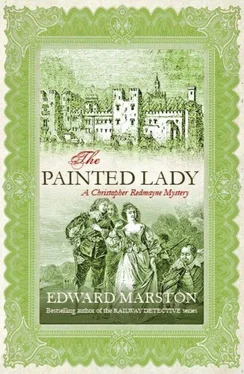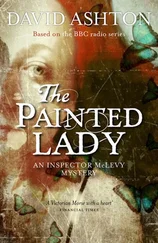Edward Marston - The Painted Lady
Здесь есть возможность читать онлайн «Edward Marston - The Painted Lady» весь текст электронной книги совершенно бесплатно (целиком полную версию без сокращений). В некоторых случаях можно слушать аудио, скачать через торрент в формате fb2 и присутствует краткое содержание. Год выпуска: 2011, ISBN: 2011, Издательство: Allison & Busby, Жанр: Исторический детектив, на английском языке. Описание произведения, (предисловие) а так же отзывы посетителей доступны на портале библиотеки ЛибКат.
- Название:The Painted Lady
- Автор:
- Издательство:Allison & Busby
- Жанр:
- Год:2011
- ISBN:9780749010324
- Рейтинг книги:3 / 5. Голосов: 1
-
Избранное:Добавить в избранное
- Отзывы:
-
Ваша оценка:
- 60
- 1
- 2
- 3
- 4
- 5
The Painted Lady: краткое содержание, описание и аннотация
Предлагаем к чтению аннотацию, описание, краткое содержание или предисловие (зависит от того, что написал сам автор книги «The Painted Lady»). Если вы не нашли необходимую информацию о книге — напишите в комментариях, мы постараемся отыскать её.
The Painted Lady — читать онлайн бесплатно полную книгу (весь текст) целиком
Ниже представлен текст книги, разбитый по страницам. Система сохранения места последней прочитанной страницы, позволяет с удобством читать онлайн бесплатно книгу «The Painted Lady», без необходимости каждый раз заново искать на чём Вы остановились. Поставьте закладку, и сможете в любой момент перейти на страницу, на которой закончили чтение.
Интервал:
Закладка:
‘I believe that it will do,’ she said.
Eleanor was overjoyed. ‘Then I am to wear it?’ she cried.
‘We’ll see. I need to discuss the matter with my husband.’
‘Of course.’
‘Where is he, by the way?’
‘Smoking a pipe in the garden,’ replied Eleanor. ‘He asked me to call him as soon as you returned.’
‘Well, let me dress quickly,’ said Araminta, crossing to the wardrobe. ‘I don’t want to keep him waiting.’
Sir Martin Culthorpe was a creature of habit. Twice a day, he always liked to smoke a pipe and the garden was the place in which he preferred to smoke it. Even on cold days, or when it was raining, he would venture outdoors and shelter in the arbour while he puffed away. Only heavy snow or a violent thunderstorm could confine his pipe to the house. It was not merely the pleasure of inhaling the tobacco that he savoured. Sir Martin was a contemplative man and a stroll in his garden was the perfect time to reflect on the issues that preoccupied him.
By comparison with the garden on his country estate, the one in Westminster was quite small but it was still large enough for him to promenade for five minutes or so without retracing his steps. Formal in design, it had endless trees and neat rows of bushes dividing it up and creating private corners where he could sit without being visible from the house. At the centre of the garden was a large pond with a fountain in the shape of Neptune, and there was a great deal of other statuary dotted here and there.
Pulling on his pipe, he strode along between an avenue of mulberry trees, wondering how his wife had fared at her latest sitting. Sir Martin still could not believe his good fortune in having married Araminta Jewell and he vowed to devote the rest of his life to her. What he did not realise, as he turned leisurely into a shaded grotto, was that his life was just about to come to an end.
Chapter Three
Christopher Redmayne liked to keep a close eye on any project in which he was involved. Even at the earliest stage, he visited a site regularly to watch work in progress. More illustrious architects would not have deigned to spend so much time amid the dirt and dust of construction, preferring to dispatch their assistants to take care of such matters, but Christopher worked alone and would not, in any case, have delegated such a task to another. He loved to see the foundations being laid and to watch a building rise slowly from the ground and take on the shape he had envisaged when bent over his preliminary drawings.
The important work of designing churches, livery halls and public buildings in the wake of the Great Fire went to more famous members of his profession, but Christopher had no objection to that. There was still plenty for him to do. The blaze had destroyed over thirteen thousand houses, wiping them from the face of the city and leaving only charred remains in their stead. Architects and builders were therefore in great demand so there was no shortage of work for able men. All over London, Christopher had made his small, personal contribution to the rebuilding of a great city that he loved.
‘No disrespect to you, Mr Redmayne,’ said Samuel Littlejohn as he washed down his food with a swig of beer, ‘but, when my father was a builder, he never worked with architects. The client would tell him what he wanted, show him an example of it in a drawing then leave him to it. My father did the rest.’
‘That’s because he was a master builder, Sam,’ said Christopher with a smile, ‘part of a tradition that went back for centuries. It was a big mistake to let people like me take over some aspects of his work.’
Littlejohn chortled. ‘We’ve learned to respect you, sir.’
‘That’s all we ask.’
Having inspected the site that morning, Christopher was dining at a nearby tavern with Littlejohn, a man whose bulk belied his name. He was a brawny man of middle years with a capacity for hard work and a jovial manner. His weather-beaten face and rubicund complexion gave him the appearance of a farmer but he was essentially an urban creature, having begun with, then inherited, the building firm that his father had started. Christopher was very fond of him though the partnership between them had got off to a difficult start because the client whose house they were building was murdered when only the cellars had been constructed. Their contract with him was promptly declared null and void.
There had been an additional problem for Christopher in that the builder’s daughter, Margaret Littlejohn, had become infatuated with him and caused him considerable embarrassment by stalking him. He had deemed it sensible to work with other builders for a time. As soon as the girl had been safely married to someone else, however, Christopher resumed his work with Littlejohn and they proved to be an effective team. The builder was a rough and ready man whose table manners were less than refined, but who was nevertheless an amiable dinner companion. What Christopher liked about him was that he always spoke his mind. After chuckling over an incident that had occurred during the last house on which they had worked together, Littlejohn became solemn.
‘We could have one problem,’ he warned.
‘I know what you’re going to tell me,’ said Christopher, trying to anticipate him. ‘That facade is too elaborate. We’ll need the very best stonemasons to work on it, Sam.’
‘I’m not worried about the facade, sir.’
‘Then it must be that staircase Monsieur Villemot insists upon having. I’ve never seen anything so grand outside a French chateau.’
‘Let him have his staircase, Mr Redmayne. Let him have anything and everything he wants. If, that is,’ he said, darkly, ‘he’ll occupy the house when it’s built.’
‘Why else would he commission it?’
‘Because he needs more room.’
‘Then where is the problem?’
‘He’s an artist.’
‘So? Artists need somewhere to live just as much as anyone else. Architects, too, oddly enough. We all need a roof over our heads.’
‘Mr Villemot is a French artist.’
‘What difference does that make?’
‘Only this, sir — he could be unreliable.’
‘I don’t see why.’
‘I built a house for a Frenchman once before,’ said Littlejohn, taking another sip of beer, ‘and, before it was finished, he sailed back to France without a word. We never saw him again. He owed us a lot of money. We were left with a half-built house and no client. I’d hate to be in that position again.’
‘Was the client an artist?’
‘In a manner of speaking — he was a dancing master.’
‘Well, I can assure you that Jean-Paul Villemot is not going to dance off to Paris. He prefers to work in London, where he’s the toast of his profession. He won’t let us down, Sam,’ said Christopher, airily. ‘He intends to stay and see the project through.’
‘What about his fits?’
‘I didn’t know he was subject to them.’
‘Not those kind of fits, sir,’ said Littlejohn. ‘I was talking about the other kind — the sort that all foreigners seem to have, but especially the French. They have these fits of temper, funny moods, silly ideas, sudden changes of mind. The dancing master was like that. He made our lives a misery with his fits. You never knew where you stood with him from day to day.’
‘What you’re saying is that he was capricious.’
The builder nodded. ‘ That’s the word I was trying to think of.’
‘Well, you’ve no need to apply it to Monsieur Villemot.’
‘I wish I could believe that, sir.’
‘He seems to have a most equable temperament and he’s promised not to interfere in our work in any way. He’s far too busy, painting portraits of the rich and famous. Take heart, Sam,’ said Christopher, ‘nothing can possibly happen to stop this house being built and paid for in full. If it did,’ he added with a carefree laugh, ‘then I’ll be the one having a fit.’
Читать дальшеИнтервал:
Закладка:
Похожие книги на «The Painted Lady»
Представляем Вашему вниманию похожие книги на «The Painted Lady» списком для выбора. Мы отобрали схожую по названию и смыслу литературу в надежде предоставить читателям больше вариантов отыскать новые, интересные, ещё непрочитанные произведения.
Обсуждение, отзывы о книге «The Painted Lady» и просто собственные мнения читателей. Оставьте ваши комментарии, напишите, что Вы думаете о произведении, его смысле или главных героях. Укажите что конкретно понравилось, а что нет, и почему Вы так считаете.












